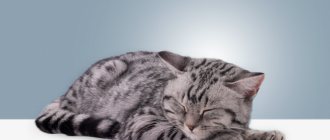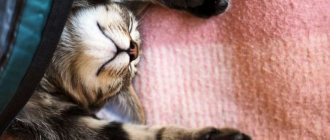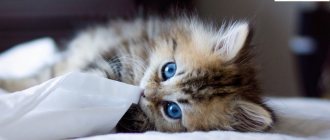The reasons why a cat keeps you awake at night can be varied. However, if nighttime behavior, excessive activity and loud cries become a regular occurrence, the owner should determine what is wrong with his pet as soon as possible. If everything is fine with your health and the fault is the wrong daily routine, you can wean your cat from running at night, following the advice suggested by experts.
Why doesn't the cat sleep at night?
Cats are small predators for whom hunting at night is a common thing.
Adult pets living in comfortable conditions and having free access to food may fall asleep early in the morning and sleep all day. When evening comes, the pet wakes up, its activity intensifies, it begins to play and demand attention. This case is natural; if desired, the lifestyle of your four-legged friend can be adjusted.
Main reasons
But sometimes the reasons why a cat does not sleep are associated with the negative influence of external and internal factors, among which the following are considered common:
If your pet does not allow you to sleep, then there are reasons for this, for example, he is hungry or he receives little attention during the day.
- Stress. Often a small kitten does not sleep at night due to the stress caused by parting with its mother and moving to a new home. You just need to wait out this period, surround the baby with care and affection so that he quickly gets used to the new environment.
- Demand for attention. If the owner leaves home for the whole day and the cat is left all alone, he may even become depressed. As soon as a person comes home, the pet immediately asks for attention. The animal does not fall asleep until the owner plays with it and cries if the owner ignores communication.
- Hunger. A pet that doesn't eat regularly or doesn't get enough food may wake up in the middle of the night if it's hungry. If a cat meows or scratches at the door, demanding food, you should not ignore his requests. In addition, it is important to establish a diet so that hunger does not take you by surprise at the wrong time.
- Hormonal surges. A cat's heat is always accompanied by serious changes in the animal's behavior. In a fit of passion, the cat tirelessly rushes around the house, scratches doors, rages, and has trouble sleeping at night.
- Progression of internal diseases. Often, various diseases have a negative impact on the overall well-being of a cat. The animal is experiencing pain, discomfort and other problems. The pet cannot get enough sleep, so even in the morning his mood is bad, he constantly lies down to somehow alleviate the condition.
Remove sources of temptation
Cats like to climb to heights. When the owner is sleeping, the animal can jump from a high place directly onto a sleeping person. To avoid such a situation, eliminate all dangerous places where your pet lives: shelves, cabinets that you can climb on and then jump down. Move dangerous furniture away from your sleeping area. You can put things on top of them that are difficult to jump on and drop.
The measures taken will help wean the cat from performing acrobatic tricks at inopportune times.
How to deal with the problem?
Organize feeding correctly
To prevent the animal from asking to eat in the dark, it is necessary to properly organize its nutrition.
If the kitten does not allow you to sleep due to night hunger, veterinarians recommend giving him a nourishing, high-calorie food at night, after eating which the pet should sleep all night. Another option is to install an automatic feeder and teach the animal how to use it. Some cats sleep better when they eat raw meat. Digestion of protein foods requires a lot of energy, so after eating meat products, animals do not rush around, but lie quietly, absorbing the substances and vitamins necessary for the body.
Provide daily activity
Separate attention should be paid to the pet’s daily physical activity, and if it is not enough, it is important to make the cat move more. While the owner is at work, he needs to lock the animal in a room where it will spend the whole day alone. To prevent your cat from getting bored, experienced cat experts recommend purchasing or making your own play complex with toys, labyrinths, and other entertainment. Thanks to this, the animal plays and entertains itself all day long without the participation of the owner.
But as soon as a person comes home from work and has rested, it is important to pay attention to his four-legged friend, because toys are toys, and live communication is also important for cats. After communication, games and affection, all worries and sorrows disappear. To calm some pets down, it is enough to pet them before going to bed. After such an evening, the cat will sleep all night without disturbing the owner.
other methods
Even the slightest light can awaken activity in a cat, so it is recommended to curtain the windows and turn off all lamps at night.
In order for a healthy, well-fed cat to stop being active at night, and for the owner to get a good night's sleep, you should not follow the animal's lead, jump up at the first call, or play. The pet will perceive this as a reward, and he will want even more attention. Even dim lighting can cause your cat to be kept awake. To help your pet fall asleep faster, it is recommended to remove lighting everywhere and, if desired, cover the windows with heavy curtains, which will prevent daylight from entering in the early morning.
If the above methods do not help and it is not possible to cope with the cat’s nighttime activity, you can resort to extreme measures by giving the animal the sedative drug “Cat Bayun”. However, it is worth remembering that the medicine has contraindications and limitations, so it can only be used after prior consultation with a doctor. Self-medication can cause negative consequences, which are much more difficult to deal with later.
Causes of drowsiness in kittens
Other factors, in addition to the natural cycles of the body, are often external causes that affect both small kittens and adult animals:
1) weather conditions;
2) level of calm in the environment;
3) absence of irritants and dangers.
Sleepiness in kittens is influenced by feelings of satiety and fatigue from intense activity. In addition, in the summer heat or before rain, if the kitten is constantly sleeping, the cause may be low atmospheric pressure. Hormonal levels also affect drowsiness, because, as a rule, males are more active than females, so prolonged sleep in female kittens is by no means uncommon.
Cats fall asleep gradually, and dozing is replaced by deep sleep. According to scientists, cats can dream, and they often make meowing sounds, squeaks, and move their paws, which is a feature of their expression of emotions and should not be a cause for concern.
These reasons should not cause panic among animal owners, since they are due to the natural features of the life of their pets.
What is not recommended to do?
Some owners believe that when a cat interferes with sleep at night, it should be locked in a separate room. In this way they show that the animal causes a lot of inconvenience with its behavior. However, after such harsh measures, most are surprised that the cat not only did not stop being active when dusk came, but his behavior became much worse. Others, in an attempt to accustom their pet to order and put them to sleep faster, spray the cat’s face with water. But the animal does not understand what they want from it, as a result, resentment towards the owner appears, and the behavior may worsen.
It is a mistaken belief that a pet should not be woken up during naps. But if a young cat sleeps all day, it is natural that he will want to frolic at night, because the cat has more than enough energy. Therefore, when there are obvious problems with falling asleep, it is better to wake up your pet during the day, force him to play and be active. Then at night he will have a strong, healthy, deep sleep.
Lack of activity and exercise
Cats that don't usually get any exercise have a greater predisposition to be active at night due to energy storage. Despite their reputation for being calm and sedentary animals, cats are also animals that need to exercise and maintain physical and mental stimulation while playing.
Unfortunately, the myths that have arisen about this species have led many cat trainers to believe that they do not need as much attention on their part, and nothing could be further from reality. These animals also need to spend hours with their human companions, play and exercise, as well as receive affection and feel cared for.
When there is cause for concern
Should an owner worry if his pet sleeps too much or too little? Yes, there is cause for alarm if the following warning symptoms are present:
- Lack of appetite;
- Apathy while awake (the animal does not play, does not communicate with the owner, looks depressed);
- Poor condition of the coat (the fur is dull, brittle, falls out a lot, there may be bald patches on the animal’s body);
- Problems with bowel movements (constipation or diarrhea);
- Nausea and vomiting;
- Constantly hot, dry nose (crusts and sores on the nose are also a concern);
- Discharge from the nose or eyes, bad breath;
- Increase or decrease in body temperature;
- Jumps in blood pressure and pulse;
- Change in the usual shade of the mucous membranes (pallor, cyanosis, redness).
If the animal sleeps too much or too little, and at least some of the symptoms listed above are present, the owner urgently needs to show his mustachioed pet to a veterinarian. But if the cat is cheerful, active and eats well while awake, the owner most likely has nothing to worry about.
Signs of poor appetite
If an animal sometimes refuses to eat, then there is nothing wrong with that. You may not always notice weight loss right away. Cats that live indoors need less food. Therefore, they may sometimes not feel hungry and drink only water.
Loss of appetite may be a sign of serious problems
Veterinarians identify several thinness indices. When exhausted, the animal's ribs clearly appear; if you look at it from above, its figure will resemble an hourglass. The stomach is strongly retracted.
If the cat is underweight, the ribs and spine will be clearly palpable, and there will be no fat layer. With normal weight, the animal looks like an even rectangle from above. The ribs can be felt during normal examination, but a small amount of fat will be felt.
Important! Being overweight is just as dangerous as being underweight.
The owner should only start to worry if the cat is emaciated or underweight. In this case, it is better to consult a veterinarian to determine the cause of the weight loss.
Sometimes the condition is accompanied by additional symptoms - vomiting, drowsiness, lethargy. All this may indicate the development of a serious illness. A particularly dangerous sign is refusal of water.
Dangerous symptoms
A kitten that sleeps a lot, does not like to play active games, eats poorly and eats little, may be seriously ill. Pay attention to your pet and the presence of other pathological symptoms. Signs of the disease:
- dry and hot nose;
- refuses to drink;
- temperature, body tremors;
- loose stools;
- vomit;
- pallor of mucous membranes;
- dull coat;
- impaired coordination;
- giving up your favorite treats;
- lack of reaction to people, loud sounds, lights;
- dilated pupils;
- rapid breathing.
Any of the listed symptoms is considered a deviation from the norm. To understand why your pet has stopped playing, eating and drinking, you need to consult a veterinarian.
If you know that the cause of poor health is poisoning, rinse the kitten’s stomach and give activated charcoal. After these steps, go to the veterinary clinic.
If the cat sleeps a lot and is lethargic: when this is due to natural reasons (after sterilization, castration or with the onset of winter); what to do if she becomes lethargic for no reason; what diseases are accompanied by drowsiness.










